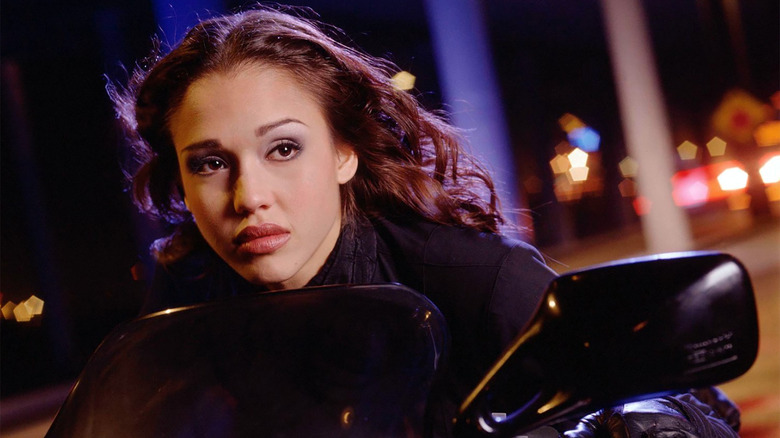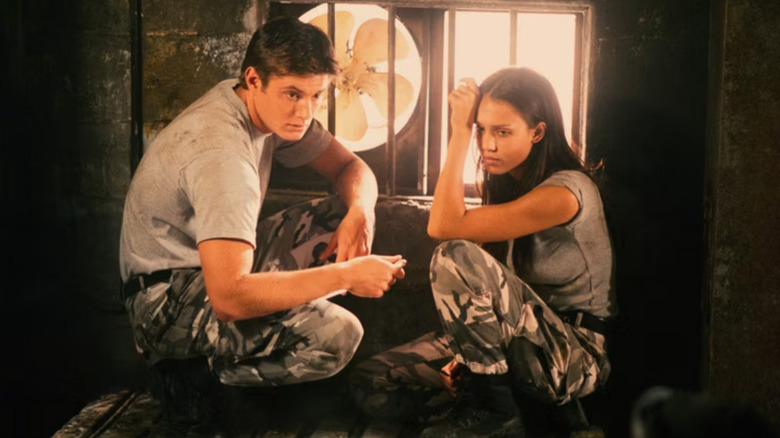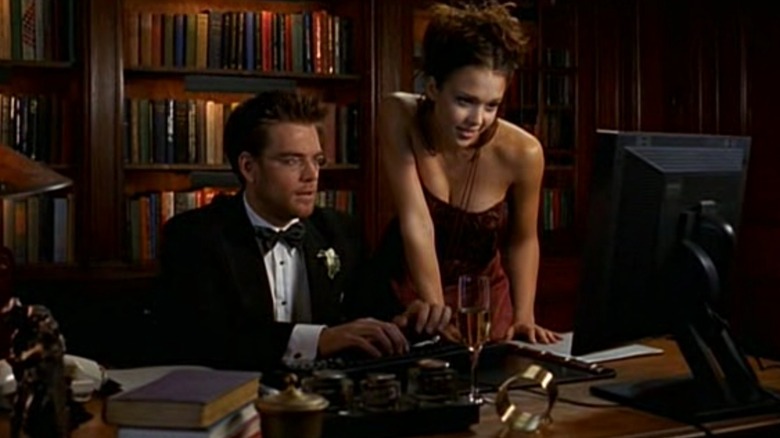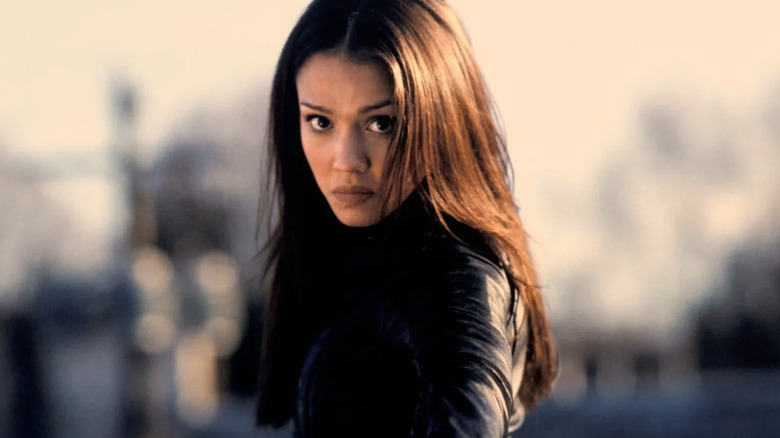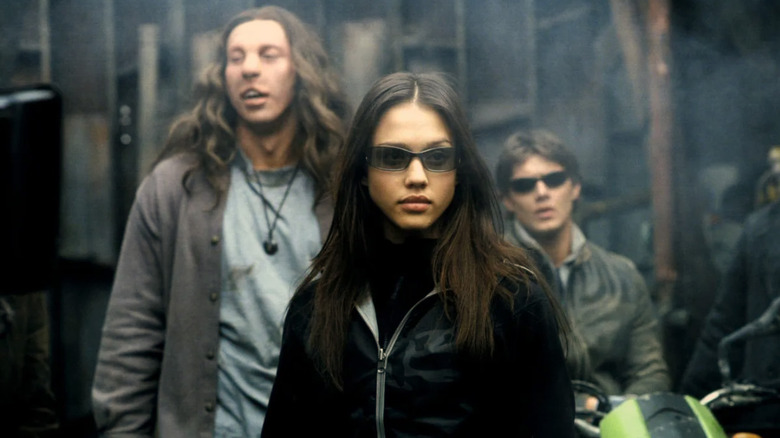TV, Interrupted: Dark Angel Was Canceled On A Cliffhanger Ending
(Welcome to TV, Interrupted, a series where the /Film team remembers, eulogizes, and makes a case for the revival of TV shows we loved that were canceled far too soon.)
The television series "Dark Angel" hit screens for the first time in the year 2000, offering up a story about a genetically-engineered young woman named Max (Jessica Alba) after she escaped from the lab that created her and tried to make a life for herself in a dystopian future version of America.
"Dark Angel" was created by "Titanic" and "Aliens" director James Cameron and "NYPD Blue" co-executive producer Charles H. Eglee, with episodes running for an hour each in Fox's primetime block. The series featured a young Jessica Alba in her breakout role, though she had been in some movies prior to her casting in "Dark Angel," including the horror-comedy "Idle Hands" in 1999 and the romantic comedy "Never Been Kissed" that same year.
Like most of Cameron's work, "Dark Angel" focused on a strong, independent woman in a science-fiction setting. Max was a heroine in the same vein as Sarah Conner from "Terminator" and Ellen Ripley from "Aliens;" she was just younger, more hip, and therefore much more relatable to younger audiences. By day, Max worked as a bike courier for Jam Pony, and by night, she tried to learn more about her creators and captors in order to evade them permanently.
The series ran for two seasons before being rather unceremoniously canceled ahead of season 3. In fact, Fox had told the cast and crew that "Dark Angel" season 3 was a go, only to turn around the following Monday and inform them that they had decided to cancel it instead. Yikes on bikes!
So what happened? Why was this fun, inventive, sometimes-feminist little sci-fi show given the axe? Let's take a deeper look at "Dark Angel," including why it ruled, why it ended, and why fans are so bummed that season 3 never hit our screens.
Why Dark Angel was great
"Dark Angel" is a cyberpunk adventure series with romance, intrigue, and a lot of fun. The show's vision of future America is fascinating, especially with the benefit of hindsight. The story kicks off in the year 2019, 10 years after a catastrophic electromagnetic pulse destroyed almost all of the computers in the country and wiped out America's amassed wealth — "turned all the ones and zeros into plain old zeros," as Max puts it. A decade later, the U.S. is "just another broke ex-super power looking for a handout."
Max has been on the run from Manticore, the company that engineered her, since she was nine years old (the pulse happened shortly after she escaped). In that time she's managed to make something of a life for herself: working as a bike courier, making friends with her co-workers, and eventually meeting rogue reporter Logan Cale (Michael Weatherly). Logan is an underground journalist who uses his platform to fight corruption, and he tries to recruit Max to help him, but she declines. He ends up being injured and confined to a wheelchair after the mission goes wrong, and Max decides to join him out of guilt.
The two begin developing romantic feelings for each other, which turns into a "will they, won't they" for the ages. Their romantic entanglement becomes more complicated in season 2, after Max has been recaptured by Manticore and they inject her with a virus specifically designed to kill Logan, who has revealed them to the world. They can't touch, which turns into all kinds of sexual tension and angst. The series also featured some pretty progressive characters and plotlines for the time period, featuring a lesbian main character, Original Cindy (Valarie Rae Miller) and the first television episode ever featuring a trans actor (Jessica Crockett) playing a trans character. Transhumanism is a huge part of cyberpunk, so that bit of transgender representation was incredible.
In "Dark Angel" season 2, we also get to see Max freeing many of the other genetically-engineered test subjects that she grew up with, including Alec (Jensen Ackles), who started out as Max's Manticore assigned mate and eventually went on to become her ally and friend. While on the "Inside of You" podcast, Ackles shared that he and Alba fought like siblings on set, and that genuinely comes across in their performances as well. They are a great brother-sister pair, and Ackles is absolutely great in his breakout role.
The series is occasionally very silly, like when it's revealed that Max has cat DNA and goes into heat, but it plays it all with such earnestness that the silliness is more fun than frustrating. The cyberpunk setting, great actors, and fun sci-fi story made the show an absolute blast to watch each week, even when the story got, well, dark.
Why Dark Angel was canceled
The series was fun, the leads were great, and the story had tons of potential to move forward after season 2 ... so what the heck happened?
Well, "Dark Angel" had a somewhat troubled production, and Cameron admitted to the Sun Journal in 2001 that the first season had gone way over budget and Fox had almost ended things right then and there. They managed to convince Fox to do a second season, but had to change nights, moving to Fridays. Unfortunately, Friday nights aren't the best for TV shows, and ratings dropped significantly after the move.
Critics were also hot and cold on the series, with some praising it for its fierce feminine hero while others were frustrated by the show's pulpy silliness. There were some problems on set, too, which might have contributed to some of Alba and Ackles' bickering. Alba and Weatherly started dating during filming, despite a 12-year age gap. The relationship didn't end well, with Alba getting a tattoo to celebrate her independence after their break-up. Weatherly hasn't exactly cultivated a good reputation for how he treats female co-stars since then, so there's really no telling what filming the series was like. For the stars, maybe the cancellation was a bit of a relief.
On top of budget issues and behind-the-scenes drama, the appetite for a show like "Dark Angel" may have been impacted by the real-world terrorist attacks in the United States on September 11, 2001. The second season premiered on September 28 of that year, and the dystopian, semi-apocalyptic story just might have been too much for some viewers. Then there was the competition from several other sci-fi/fantasy shows featuring tough female leads either on the air or coming soon, like "Buffy: The Vampire Slayer," "La Femme Nikita," and Fox's own "Firefly" (which also got quickly canceled).
Unfinished business
The creative team behind "Dark Angel" thought that the season 2 finale was going to set things up for season 3, so they built in a massive cliffhanger to try and get viewers back for the next go around. A war between a cult of ancient advanced humans created through eugenics and the scientifically-engineered "transgenics" like Max and Alec is brewing, with the potential to wipe out all "normal" humans. Humans, now aware of transgenics thanks to Logan's reveal, move to take out all genetically-engineered or advanced people in order to protect themselves.
The series finally ends with the military surrounding Terminal City, an abandoned part of Seattle where the transgenics have been hiding out and forming their own micro-country. The finale, "Freak Nation," was the first and only episode directed by Cameron, and marked his first time back in the director's chair since the Academy Award-winning "Titanic."
"Freak Nation" showed the full scope of what "Dark Angel" could become, and despite a messy second season, it had tremendous potential. It's deeply frustrating that everything ends on a cliffhanger, though fans who really want to know the full story can find out what happened in two sequel novels that take place after the series, written by Max Allan Collins. The books finish the story planned out by the showrunners and writing team, but it's still not quite the same as getting to see it acted out on the small screen.
Will Dark Angel ever return?
James Cameron is going to be busy making "Avatar" sequels for a while, so he's unlikely to be involved in a "Dark Angel" revival any time soon. Interestingly though, the show played a crucial role in Cameron's approach to writing the rest of the "Avatar" saga. "The best experience I had working with other writers was in television when I did 'Dark Angel,'" the filmmaker explained in 2014. Hoping to recreate that "highly collaborative, fun experience," Cameron created a TV-style writers room for the "Avatar" sequels, where he and the other screenwriters spent five months plotting out all three movies before dividing up to write the individual scripts. Who knows? Perhaps the whole experience has ignited some "Dark Angel" nostalgia in Cameron that could pay off for fans.
The cast is a bit more tricky; Alba and Ackles both have mixed feelings about their time on "Dark Angel" ("horrible" was the exact word that Ackles used to describe his experience working with Alba). That said, Alba later apologized and shortly after the "horrible" comment Ackles added, "I love Jess, which I know kind of contradicts what I just said." In 2019 Alba made some positive (albeit very non-committal) noises about the possibility of a revival, saying, "I think it could be fun to do a movie around 'Dark Angel.' It sort of was ahead of its time and ... it feels more real than ever before."
Bottom line, though: Cameron is extremely busy, the original core cast members aren't hugely enthused about returning (and Weatherly isn't exactly welcome on most sets these days), so the potential for a "Dark Angel" reunion revival looks incredibly slim. The most likely shot for fans of the original series to see new content would be a reboot, with an entirely new cast, though even that would be a long shot because Max and Alba are so intrinsically connected.
It's a real bummer, but "Dark Angel" is probably down for good: an oddity that future film and television historians will look back on and scratch their heads. Oh well, at least we'll always have the fan-fiction.
